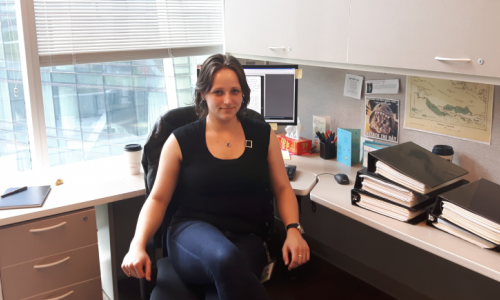
Congratulations! You landed your co-op! All of your hard work paid off but your only concern is that you might miss out the experiential opportunity of working at a real office. I had the privilege of being an HR Analyst at New Westminster School District for my co-op position. One of the most valuable takeaways I gained from this position is the importance of employees’ health and well-being. Halfway into my Spring 2020 co-op term, I went through a pretty abrupt switch to working remotely because of COVID-19. With the challenge of working from home, I would like to share some tips as a co-op student to build resilience without missing out too much out of your work term.
1. Assign Clear Working Hours and Working Space
If you used to work 9-5 at the office, you now have the freedom to take charge of your time while working remotely. However, it’s easier to get your work done by sticking to a clear schedule. In addition, a clear schedule will help you collaborate with your colleagues who are working the same time as you. My favourite schedule is to work 2-3 hours at a time and take a 30-minute-break after each working session. I find this schedule effective because it gives me condensed work-time intervals which boost productivity, while also allows me to take longer breaks so that I don’t feel burnt out and overloaded.
It would be tempting on your first few days of working remotely to work on (or near) your bed but don’t do this! There’s a reason why physical separation is crucial to ensure your work productivity. Work-life balance, in this case, means separating not only working hours from leisure hours but also working space from leisure space. Assign an ‘office corner’ in your home where you can be 100% focused and uninterrupted by your surrounding activities. I have turned my study corner at home into a functional workspace where I can concentrate on working. A little bit of décor goes a long way! Feel free to decorate and make your workspace as Instagram-worthy as you’d like (which was what I did), and you’ll find yourself spending more time at that space.

2. Set Yourself Routines and Deadlines
Most jobs under supervision will have the deadlines set up by the supervisors. However, with projects that require initiatives, it will be hard to keep track of your progress when you work at home if you don’t have a form of self-discipline. When faced with these projects from my co-op, I normally set a to-do list every morning I come to the office and tick off all of the to-do items by the end of the day. This habit is especially beneficial when I switch to working from home as I know exactly what I’m working on and have a clear mindset on which tasks to prioritize. A calendar is the most effective tool to visualize schedule and deadlines. There are a lot of apps to create one but I personally prefer to use Outlook calendar to set up to-do tasks and pop-up reminders. I can share my Outlook calendar to my teammates and also see their calendars to know their availability. If I receive an email that has an action-item from my colleagues, Outlook will suggest to add that item to my calendar so that I don’t miss out on any important task. Since all of these functions are within one platform, it’s convenient that I can communicate with my colleagues, plan tasks, and stay on top of my schedule all in one place.
3. Communicate
It will be more difficult to discuss work when everything suddenly goes fully remotely. Don’t let yourself encounter miscommunication when working from home. When in-person interaction is not an option, check in with your supervisor or colleagues over email, phone, or video chat. I personally find communication by phone calls and video chats more effective than text-based communication like emails as they are more direct and personal. I also make use of the screen-sharing feature on video chats when I want to show my work to my team. Remember to keep your team well informed!
4. Take Good Care of Yourself
Given the uncertainty of the pandemic, keeping yourself isolated can have a negative impact on both your physical and mental health. My tip is to reach out to your contacts or seek support if you need to. One of my favourite healthcare resources is the Headspace app which guides meditation sessions to relieve stress and anxiety. The app has a wide range of features, from meditation programs to progress tracking and mindful exercises. The cute animation and relaxing voiceover for each meditation session help me stay calm and refreshed, especially in stressful situations. I find this 10-minute meditation on stress relief very effective:
Apart from taking care of yourself, you should also try to maintain consistent virtual communication with your loved ones. Keep yourself well informed, but don’t let yourself be overwhelmed with the news or social media. It’s okay to take an occasional break and practice self-care.
These tips that I’ve shared can surely help not just co-op students, but also anyone who’s experiencing difficulty with remote work. It’s not always about improving productivity. Your health and well-being are equally as important in contributing to your workflow.
















